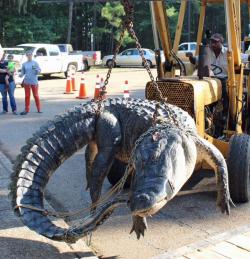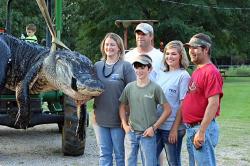Monster Alabama Gator Sets of Media Frenzy
Editor’s Note: Today’s feature comes to us from David Rainer of the Alabama Department of Conservation and Natural Resources.from The Fishing Wire
At 5 p.m. last Friday, Mandy Stokes of Thomaston, Alabama, was a wife, mom and assistant to Dr. Bill Bledsoe at the Camden Veterinary Clinic. Less than 24 hours later, Stokes was an instant, multi-national celebrity.
Stokes admits she had no idea what she was getting into during the second night of the Alabama alligator hunting season and, especially, the media feeding frenzy that started when word began to circulate about the 15-foot, 1,011.5-pound alligator that she tagged in the wee hours of this past Saturday morning in a slough near Miller’s Ferry Dam on the Alabama River.
“I don’t really know how to describe it,” Stokes said of reaction to the monster gator. “It just went nuts. John and I have a daughter that is 3 and a son that’s 1, so we kind of have a full-time job with that. I think the whole world record potential is what’s really got people stirred up.
“I never expected to be a celebrity in any way, but I sure never dreamed it would be from gator hunting.”
Stokes said CBS New York contacted her husband, John Stokes, and ABC News attempted to get an interview through Jeff Dute, who broke the story as outdoors editor of the Mobile Register/al.com.
“I’ve got an email from Fox News, but I haven’t even opened it,” she said. “I can’t keep up with all the notifications. I’m already two or three days behind just trying to be polite to people. I don’t want to be rude and ignore people, but I don’t know what I’m going to do.”
With her job as a veterinary assistant and John’s job with AT&T, Stokes said their commitments to their jobs have to come before the interviews.
“I’ve had people call me and tell me they were driving to Camden to interview me, and I told them not to come,” she said. “I don’t want to upset anybody, but I don’t have time to talk to them all. I’m at work. I’ve got kids at preschool. Plus, John and I are trying to build a house. It’s just crazy around here anyway.”
Stokes said she, John and Kevin Jenkins, her brother-in-law, went out on Thursday night, the first of the season, to look around for a gator to no avail.
“John and Kevin decided to work Friday, so we didn’t stay late Thursday so we could go back out Friday night,” Mandy said. “When we got back on the water Friday night, I think the three of us decided that we were going to tag out no matter what we found. We just didn’t have time to hang out on the river for six nights.”
Stokes said they had no idea a monster gator even lived in that narrow body of water off the river.
“I had never been in that slough in my lifetime,” she said. “It’s unlikely that I’ll ever go back to it.”
And if she draws an alligator tag in the future, she’s going to make sure John and Kevin do some downsizing.
“I don’t ever want to hook into one that size again,” Mandy said. “If we had known what was on that line, it would have intimidated us so bad that we would have never harvested it. We never really saw the gator except for his eyes and tail. We thought it was going to be a 10-footer.”
More than four hours into the fight, the team managed to get two ropes on the gator and secured him to the boat. That’s when Mandy tried to shoot the gator at the base of his skull with her 20-gauge shotgun. Unfortunately, the gator’s head went underwater when the trigger was pulled, stifling the shot. The gator then took the team on a boat ride it’ll never forget. The boat slammed into a cypress stump and sent the members of the team tumbling into the bottom of the boat.
“When we crashed into the stump, we all knew what was fixing to happen – we were either going to cut him loose or kill him,” Mandy said. “My brother-in-law managed to get another hook in him, and he said he was going to try to get his head up. He told me, ‘when I get his head up, you be ready.’ His head came up just as calm as you could ask for.”
Stokes’ second shot applied the coup de grace, and the gator rolled over.
(TOP) Personnel from Roland Cooper State Park had to bring in a backhoe to help the Alabama Wildlife and Freshwater Fisheries crew weigh the monster alligator caught during the opening weekend of Alabama’s alligator season by Mandy Stokes and her team. (Below) Team members are: (from left) Mandy Stokes, John Stokes, Parker Jenkins, Savannah Jenkins and Kevin Jenkins. The 15-foot gator weighed 1,011.5 pounds. All photos courtesy Big Daddy Lawler via ADCNR with permission.“If that attempt had failed, we were through,” Mandy said. “We were OK just to let this animal go. Our safety was at risk, and we weren’t willing to compromise that.”
When Stokes realized the epic struggle was finally over, she didn’t know how to react.
“I was speechless,” said Stokes, who still gets breathless reliving that night. “I was so overwhelmed with emotion at that point I didn’t know what to do. I thought, oh, what just happened?”
The emotion of the successful hunt quickly turned into work as another rope was tied to the gator and the trolling motor was used to navigate out of the stump-filled slough in the early morning fog.
After exiting the slough, the boat was pulled onto the bank of the river to secure the gator for the 2-mile trip to the boat ramp.
“We really tied him up good, because we knew if he ever came off the boat, we’d never find him again,” Stokes said. “We tied him the best we could. In fact, we ran out of rope.”
When the Stokes team finally made it to the weigh station at Roland Cooper State Park, Alabama Wildlife and Freshwater Fisheries personnel were then presented with an obstacle similar to what the hunters experienced – the gator was too big for the equipment.
Wildlife Biologist Mike Sievering said Big Daddy Lawler, who hosts an outdoors radio show in central Alabama, alerted the weigh station crew that a gator was coming in just as the scales were about to close.
The behemoth arrived on a flatbed trailer, and Sievering knew right away that this gator was special.
“This thing was huge,” Sievering said. “I’d never seen anything that big.”
The previous gator that topped the Alabama harvest charts was the so-called Fancher gator at 14 feet, 2 inches and 838 pounds. That gator also came into the weigh station at Roland Cooper.
“The equipment on the Fancher gator was just fine,” Sievering said. “But on this one, the winch just wasn’t big enough. We got him off the ground, but one of the clevises popped and straightened out. Finally, we got up with State Parks and got them to bring a backhoe in there so we could weigh it correctly. Kudos to State Parks for helping out on that deal, or we’d have been in trouble.
“We had to re-rig it several times and tie the tail up to get it weighed. A 15-footer is a lot of animal hanging there.”
As for the world record, there are really no set parameters to determine a world record, although it appears the length of the gator could be the determining factor. The Safari Club International recognizes a gator from Texas that was 14 feet, 8 inches long and weighed 880 pounds. The Arkansas state record gator weighed 1,100 pounds, but it measured 13 feet, 9 inches.
“It was something to see,” Sievering said. “That girl, Mandy, sure was proud of it, but she was basically in shock at how big it was.”
Stokes hasn’t been the only one inundated with media requests since the big gator hit the scales.
“I spent Monday morning on the phone with CBS, Fox News and a bunch of others,” Sievering said. “There was even a media outlet from France that did an interview. I couldn’t get my weekly report done. Heck, I couldn’t even get a cup of coffee.”
Wildlife and Freshwater Fisheries Director Chuck Sykes said the Stokes gator highlights another exciting hunting opportunity for outdoors enthusiasts in Alabama that has been in existence for a relatively short time.
“We are now in the ninth season of our alligator hunts, which began in August of 2006,” Sykes said. “Since that first year, we have more than tripled the size of our three hunt zones, coupled with an increase in tags to match. Each year, interest continues to increase from Alabama hunters for the opportunity to hunt this elusive species. As stewards of Alabama’s natural resources, we strive to manage for sustainable populations of alligators. With sound management practices, such as regulated quota hunts based upon continued population monitoring, we anticipate that Alabama hunters will be able to enjoy these hunts for many years to come.”

